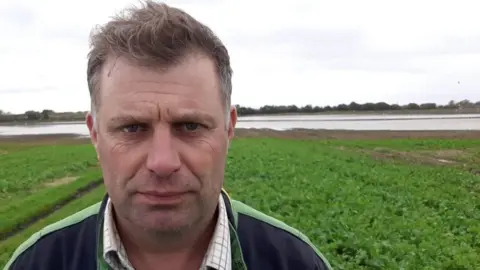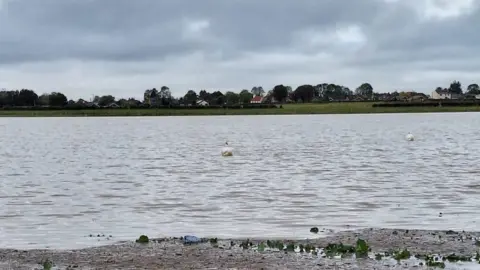No new mental health support for farmers hit by floods
 Henry Moreton
Henry MoretonFlood-hit farmers who have lost thousands of pounds worth of crops do not need new targeted mental health support, says the government.
A committee of MPs had raised concerns over a lack of health services helping those hit by such "shock events".
But the government said on Friday that extra emergency funding to support crisis-hit farmers was not needed.
Farmers say the floods have taken a huge toll on their mental health and they have received little support.
Lincolnshire grower Henry Moreton currently has 155 acres (0.6 sq km) of land under water at his 500-acre (2 sq km) farm near Woodhall Spa.
The 50-year-old sixth-generation farmer estimates he has lost between £55,000 and £65,000 worth of oil seed rape, winter wheat and barley to flooding after Storm Babet hit last week.
 Henry Moreton
Henry MoretonThe father-of-one told the BBC: "I'm a very glass-half-full chap all the time. I'm always optimistic, my wife says, but when I went up our farm road towards the river on Saturday morning I got as far as the pond and I just stopped and cried because I didn't know what to do. What do you do?
"I've never had the wind taken out of my sails like it.
"My wife was that worried she hid the shotgun cabinet keys. She only told me that yesterday. She said she had never seen me look like that."
In May, the UK Parliament's Environment, Food and Rural Affairs (Efra) committee published a report into rural mental health.
It found that extreme weather events and animal health crises - including mass culls to control diseases like bird flu - left farmers, their workers and their vets dealing with mental health trauma with little support.
It called on the government to provide dedicated emergency funding to "enable local areas to quickly access more resources to respond to rural communities' mental health needs during and, crucially, after crisis events".
But, in a response published on Friday, the government said it would not allocate specific funding and that current levels of support were sufficient.
It said guidance on the impact of flooding on mental health was provided on its website and that it worked with charities and organisations, such as the National Flood Forum, to support people at risk of flooding.
A Defra spokesperson said the government was "acutely aware of the impacts flooding and climate events can have on farmers, including on their mental health".
It added that Environment Agency teams were "working hard on the ground to help people recover from Storm Babet and the current impacts being felt by Storm Ciarán".
It said it was also providing support through its rural business support scheme, the future farming resilience fund, to link up farmers with mental health service providers.
But Sir Robert Goodwill, the Efra committee chair, said he was "disappointed" by the government's "rejection of measures to support the specific and identifiable mental health needs of those who live in rural areas".
"This was an opportunity to make significant changes which could greatly impact our rural communities. With this response the government demonstrates a worrying degree of complacency," he added.
'Few options'
Mr Moreton said that with long waits at his local GP's surgery, he had few options for mental health support in the immediate aftermath of the flooding.
Instead, he has depended on family and friends, already helping him after his father - "my best friend and my work mate since I was nine" - died from cancer 18 months ago.
"When he died I knew what to do, I just kept going. But when something happens like this (flooding) it's out of your control. I never felt like I ran into a brick wall like that before and there's no-one out here to talk to, apart from friends," Mr Moreton said.
He said he felt the government "did not really care about farmers" but acknowledged more needed to reach out for help, saying: "Farmers are our own worst enemy. We never want to admit we are weak and we are very good at saying we are absolutely fine when we're not."
If you have been affected by any issues raised in this article, help and support can be found at BBC Action Line

Sign up for our morning newsletter and get BBC News in your inbox.

